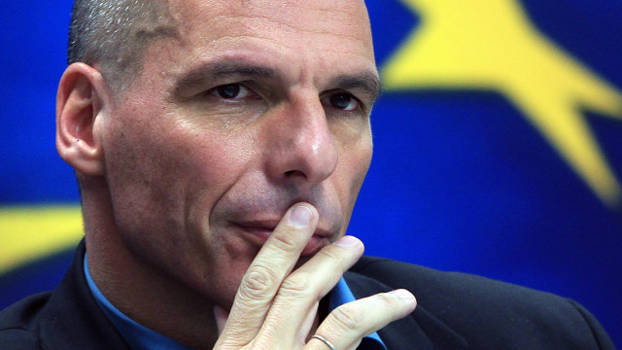Yanis Varoufakis Chiarisce intervista al Corriere della SeraAnche perchè l’intervista è stata stralciata con omissioni e facendo intendere cose diverse da quelle affermate. Giudicate voi.
For the Italian version as published in CDS, click here. But beware: The Italian text there is a summary of my answers and, in my view, offers a distorted version of my original answers in English (including the awful title) – which you can read here… |
|
| How are you? Do you regret having resigned? Are you missing your months as a State minister?Personally I am flourishing, even though the political situation in Greece after our 13th July surrender is sad and augurs nothing good for Greece or for Europe. It is the reaction to me of people on the street, in Greece, Italy, France, even in Germany, in conjunction with the freedom to pursue my political agenda outside the strictures of government, that gives me much joy. Do I miss being minister? Definitely not. The ministry was a duty that was worth bearing only as long as we were guided by principle. My successors, in contrast, had the task of managing that awful surrender. I do not envy them. After all, if I did I would not have resigned!
The stress you went through during spring and summer have had an influence on your personal relationships? No, not at all. True love and friendship survives such trials. My five months in government won me more true friends while the resignation unveiled the fake ones. Have you enjoyed being a style model, being pointed as a sex symbol, having fan like a rock star? No. I have detested the star system all my life. It would have been the height of hypocrisy to enjoy its output the moment, for some unknown to me reason, the same system elevated me to a fake pedestal. Do you think this kind of attention was detrimental to your success as a negotiator? No. The hostility I faced was not personal and had nothing to do with my public image. It was simple due to our government’s audacity to say “No!” to a failed troika program. Were your colleagues uneasy with your popularity? You have to ask them. It did not seem that way to me. It has been said you are finishing a new book. Can you tell us the title and the main thesis? All my life, at least since 1989, I have been finishing some book! So, yes, I am about to put the finishing touches on a book that was almost completed before the January election, but which was abandoned the moment I became minister. It is entitled AND THE WEAK SUFFER WHAT THEY MUST? (To be published in New York by Nation Books). The theme is nothing less than a history of the euro… You declared to be ready to work on a continental project for a New Left. In Frangy-en-Bresse you met Arnauld Montebourg. Have you two planed something concrete? Is the project going forward? In which way? Definitely. And it is not just the two of us. We are part of a Pan-European Network dedicated to democratising the Eurozone. Except a formal announcement soon. What do you mean for “left” in politics? Aristotle defined democracy as the system of government in which the poor, who are always in the majority, rule. In this sense, the Left is the custodian of democracy, insisting as it does that decisions affecting the lives of the majority are taken by their representatives, in their interest, and without bowing to the directives of the powerful few who command the majority of material resources. Democratising the Eurozone, even if it is only in the sense of bringing a dose of liberal democracy to the Eurogroup, seems to me a good start for the Italian, Greek, Spanish, German Left to reinvigorate itself. Tsipras won the referendum that refused an hard MoU, but accepted an even harsher MoU. Did you understand why? Of course I understand, even if I disagree with his choice. The reason he caved in is that he was threatened with an expulsion of Greece from the Eurozone, in a manner that would do untold damage to the weakest of Greeks. It was a terrible blow at European democracy. My view was, however, different. We had just received 62% of the referendum vote instructing us, in my interpretation, as follows: Seek an honourable agreement within the Eurozone. But if Europe’s leadership does not want an honourable agreement, let them do their worst. Just do not surrender! But surrender we did… Was your plan B viable? Was it an act of “high treason”? It would have been high treason not to have a Plan B, at a time when everyone else did. Was it viable? This is a hard question. And it is hard for the following reason: No Plan B, the purpose of which to prevent an exit from the euro, can be operational! To be operational, it would have to become known. But the moment a finance minister begins even an academic discussion of “exit”, depositors panic, pull their deposits out, the ECB pulls the plug, the banks close and the exit happens before a proper public debate can be had. The conclusion here is that a Plan B can only be prepared at an abstract level. Its activation will always be messy and bear large costs. That does not mean, of course, that these costs are, in the long run, greater than the cost of constantly capitulating to outrageous troika demands. What is happening with privatizations? Is Germany going to buy Greek assets for peanuts? Was it part of the German plan? I would like to think that this was not the German government’s intention. Having said that, I would have thought that Berlin should ask German companies to stay clear of Greek fire sale privatisations lest Germany is seen to be taking advantage of its might over a defeated nation. You talked about “European terrorism” and a “Schäuble plan to provoke a Grexit”. Are you still of the same opinion? I did not talk of European terrorism. Journalists should learn, at last, the art of accurate reporting. What I did say was that the Greek voters, during the week leading to the referendum, were terrorised with the images of closed banks and the threat that the banks would never open again if the voted “No!”. This is accurate. Closing down the banks of a modern economy spreads immense fear. Terrorism is the pursuit of political means by spreading fear. Greek voters were subjected to just that practice. As for Dr Schäuble’s plan to have Greece amputated from the Eurozone, it is not a matter of my opinion. He told me that Grexit was the only solution… You said that the ghost of a Grexit is a way to strengthen a German style discipline. What makes Italian, Spanish and French Social Security Systems a problem for Germany? A reluctance to accept a fiscal overlord with the right to veto your national budgets. You have always thought that Euro can be reformed. Given the “unelected technicians running the Eurogroup”, the democracy deficit of the European institutions, the economical stagnation, do you still have the same opinion? I am struggling to keep my faith… You said that the “debt restructuring is a prerequisite of success for reforming Greece”. Europe didn’t allow any debt restructuration. So what? Greece is not reforming itself? No country caught up in a Great Depression can reform itself meaningfully. And as long as the debt is not restructured, Greece’s debt-deflationary spiral, fuelling our Great Depression, will continue. Is the current MoU going to solve the Greek crisis or are we going to face a new Grexit dilemma? Alexis Tsipras and I disagreed because he thought that the new MoU was the only alternative to Dr Schäuble’s plan. I saw the former as part of the latter. Hopefully, by the time the next Grexit scare hits, Europe will have pulled itself together and Dr Schäuble’s plan will be shelved in favour of a Pan-European Recovery program – a European New Deal. Are you going to be a candidate? Why not? I am not standing in this election. The Syriza I served no longer exists, torn apart by our humiliating capitulation. Unwilling to join the new leftist party that emerged from that split, I am turning my attentions to where the solution must be found: Europe. Is European democracy at risk? Greece surrendered on 13th July but it was Europe’s democracy that was mortally wounded. Unless Europeans realize that their economy is run by unelected and unaccountable pseudo-technocrats, committing one gross error after another, our democracy will remain a figment of our collective imagination. |
Titolo del CdS e link
Crisi Grecia, Varoufakis: «Tsipras?
|


